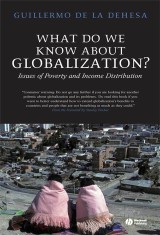Details

What Do We Know About Globalization?
Issues of Poverty and Income Distribution1. Aufl.
|
36,99 € |
|
| Verlag: | Wiley-Blackwell |
| Format: | |
| Veröffentl.: | 04.02.2009 |
| ISBN/EAN: | 9780470765890 |
| Sprache: | englisch |
| Anzahl Seiten: | 384 |
DRM-geschütztes eBook, Sie benötigen z.B. Adobe Digital Editions und eine Adobe ID zum Lesen.
Beschreibungen
<i>What Do We Know About Globalization: Issues of Poverty & Income Distribution</i> examines the two fundamental arguments that are often raised against globalization: that it produces inequality and that it increases poverty. <br /> <ul> <li style="list-style: none"><br /> </li> <li>A lively and accessible argument about the impact and consequences of globalization from a leading figure in economics - Dehesa is Chairman of the Centre for Economic Policy Research and a member of the Group of Thirty<br /> </li> <li>Demonstrates the ways in which wealthy nations and developing countries alike have failed to implement changes that would result in a reversal of these social ills<br /> </li> <li>Dispels the notion of the so-called 'victim of globalization', demonstrating how, despite popular belief, acceleration of globalization actually stands to reduce the levels of poverty and inequality worldwide<br /> </li> <li>Asks whether increased technological, economic, and cultural change can save us from international income inequality, and by extension, further violence, terrorism and war</li> </ul>
<p>Preface vi</p> <p>Chapter I Latin and Indo-European 1</p> <p>Chapter II The Languages of Italy 37</p> <p>Chapter III The Background to Standardization 77</p> <p>Chapter IV ‘Old’ Latin and its Varieties in the Period c.400–150 BC 90</p> <p>Chapter V The Road to Standardization: Roman Latin of the Third and Second Centuries BC 130</p> <p>Chapter VI Elite Latin in the Late Republic and Early Empire 183</p> <p>Chapter VII Sub-Elite Latin in the Empire 229</p> <p>Chapter VIII Latin in Late Antiquity and Beyond 265</p> <p>Glossary 305</p> <p>Appendix: The International Phonetic Alphabet 316</p> <p>Bibliography of Reference and Other Works 317</p> <p>Index 319</p>
“Consumer warning: Do not go any further if you are looking for another polemic about globalization and its problems. Do read this book if you want to better understand how to extend globalization’s benefits to countries and people that are not benefiting as much as they could.” <br /> <i>From the Foreword by Stanley Fischer <!--end--></i> <br /> <p>“Guillermo de la Dehesa masterfully synthesizes a wide universe of empirical findings and conceptual reasoning to shed much-needed light – not heat – on the big issues of globalization.”<br /> <i>Jeffrey Frankel, John F. Kennedy School of Government, Harvard University</i><br /> </p> <p>“Extended literature review … approach, supplemented generously by the author’s own careful analysis, makes the essays both substantial and accessible to a wider audience.” <i>Choice</i><br /> </p> <p><br /> </p>
<b>Guillermo de la Dehesa</b> is the Chairman of the Centre for Economic Policy Research. He spent twenty years in various Spanish governmental positions from the late 1960s through to the 1980s. Since leaving the public sector he has held a number of chairman and chief executive positions in the private sector; he is currently Vice Chairman of Goldman Sachs Europe, Independent Director of the Santander Banking Group and of Aviva plc, and Chairman of the Instituto de Empresa Business School. He is a member of the “Group of Thirty,” a non-profit, independent consultative group which counts luminaries such as Mervyn King (Governor of the Bank of England), Larry Summers (former President of Harvard), and Paul Krugman among its ranks. Guillermo de la Dehesa is also the author of <i>Winners and Losers in Globalization</i> (Blackwell, 2006).
<i>What Do We Know About Globalization: Issues of Poverty and Income Distribution</i> examines the two fundamental arguments that are often raised against globalization: that it produces inequality and that it increases poverty. Here Guillermo de la Dehesa, current Chairman of the Centre for Economic Policy Research (CEPR), demonstrates how, despite popular belief, acceleration of globalization actually stands to reduce the levels of poverty and inequality worldwide, and explains, in detail, the ways in which wealthy nations and developing countries alike have failed to implement changes that would result in a reversal of these social ills. Dehesa dispels the notion of the so-called 'victim of globalization', and poses the question: could increased technological, economic, and cultural change actually save the world from international income inequality; and by extension, further violence, terrorism, and war?
“Consumer warning: Do not go any further if you are looking for another polemic about globalization and its problems. Do read this book if you want to better understand how to extend globalization’s benefits to countries and people that are not benefiting as much as they could.” <br /> <i>From the Foreword by Stanley Fischer <!--end--></i> <br /> <p>“Guillermo de la Dehesa masterfully synthesizes a wide universe of empirical findings and conceptual reasoning to shed much-needed light – not heat – on the big issues of globalization.”<br /> <i>Jeffrey Frankel, John F. Kennedy School of Government, Harvard University</i><br /> </p> <p>“Extended literature review … approach, supplemented generously by the author’s own careful analysis, makes the essays both substantial and accessible to a wider audience.” <i>Choice</i><br /> </p> <p><br /> </p>

















